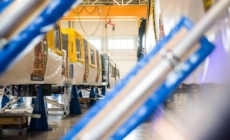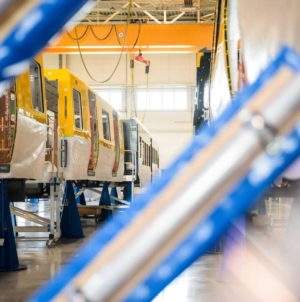-
Fox News Digital’s News Quiz: January 10, 2025 - 9 mins ago
-
California wildfires: ‘This Is Us’ star Milo Ventimiglia loses home days before wife is set to give birth - 11 mins ago
-
Sam Darnold highlights Brou's BUD list heading into Wild Card Weekend | First Things First - 16 mins ago
-
2024 the Second Most Successful Year Regarding Investment Stimulation - 21 mins ago
-
Column: They’re using the fires as a political piñata. Please stop - 22 mins ago
-
California Wildfires: Chris Brown and other Celebs Float Arson Theory - 24 mins ago
-
Hottest year on record in 2024 breached global warming threshold - 53 mins ago
-
Habitat Restoration Program in Hortobágy National Park - 57 mins ago
-
Lakers game against Hornets postponed due to L.A. wildfires - about 1 hour ago
-
Andrew Breitbart, Mark Zuckerberg, and the Two-Way Politics-Culture Street | Opinion - about 1 hour ago
State bill calls to certify stonecutting shops amid worker deaths
New legislation in Sacramento aims to address a rise in countertop cutters suffering an incurable and fatal disease by imposing new requirements on businesses, including safety training for workers.
Senate Bill 20, introduced this week by state Sen. Caroline Menjivar (D-Panorama City), would set up a certification system for the fabrication shops where workers cut, grind and polish stone slabs to fashion them into countertops. That certification would require that businesses have their workers undergo training on safety practices and show inspectors they are adhering to state standards.
Doctors have raised alarms as young workers have been afflicted with silicosis, a deadly illness caused by inhaling particles of crystalline silica. The lung-scarring mineral makes up more than 90% of some kinds of engineered stone, a popular product for kitchen and bathroom countertops. Workers in their 20s and 30s have ended up reliant on oxygen tanks and in need of lung transplants.
Under the bill, businesses and workers could not do stonecutting without certification, and beginning in 2027, stone slab manufacturers would be banned from providing their products to any fabricators that lack such certification. SB 20 also calls for creation of a tracking system for stonecutting shops that shows whether they are certified, as well as an online tool to report suspected violations of safety standards.
The bill would also require workshops to use “wet methods” to tamp down dust when cutting such slabs, prohibiting “dry cutting.” Emergency rules now in place require the use of water when risky work is performed, but proponents said enshrining a ban in state law was important because such regulations could change.
“By adopting the common sense standards and precautions outlined in SB 20, California can once again lead the nation on worker safety by establishing robust protections for stone cutting and fabrication workers in my district and across our state,” Menjivar said in a statement.
The new bill echoes provisions in Assembly Bill 3043, which was introduced earlier this year by then-Assemblymember Luz Rivas (D-North Hollywood) and co-authored by Menjivar and other lawmakers.
Rivas ultimately pulled that bill, which would have set up a licensing system for stonecutting shops, saying that state regulators were not receptive to her idea of creating a tracking system.
The Department of Industrial Relations, which would have been responsible for carrying out that measure, said it does not comment on state legislation. It urged workers to visit the website for its public awareness campaign on silica dust, worksafewithsilica.org.
The International Surface Fabricators Assn., which represents businesses that cut slabs, didn’t immediately provide comment on SB 20. The Silica Safety Coalition, an industry group that maintains that engineered stone can be cut safely, previously supported AB 3043 and noted the similarities with the new bill.
“The fabrication industry staunchly supports focused regulatory oversight and enforcement of workplace conditions that pose health risks from respirable crystalline silica,” it said.
The Natural Stone Institute, another industry group, also said it supported the key elements of the bill, including certification, training and registration in a database.
Rivas previously warned that without better tracking of stonecutting shops, there was no realistic way to enforce safety rules. Last year, California workplace safety regulators backed a new set of emergency measures meant to protect workers from the disease, but advocates raised concerns about staffing shortages at Cal/OSHA and the practical difficulties of locating many of the tiny workshops where slabs are cut.
California has identified more than 200 silicosis cases among countertop cutters working with engineered stone, more than half of them among Los Angeles County workers. The eruption of cases has led to at least 14 deaths, and 26 patients have had to undergo lung transplants, the California Department of Public Health said.
Industry groups have argued that engineered stone can be safely cut and installed with proper precautions, but some advocates have challenged whether such measures are adequate. Engineered stone has been broadly banned in Australia, and there have been calls elsewhere to do the same.
Attorneys representing California countertop cutters have also filed scores of lawsuits against manufacturers of the artificial slabs, arguing that the dangers of engineered stone outweigh its benefits. One of those lawyers, James Nevin, called SB 20 “well intended” but said it’s wrong to think that “certification can somehow make a deadly product safe.”
“The only way to prevent fatal artificial stone silicosis in fabrication workers is to ban artificial stone just like Australia did,” Nevin said.
Source link































